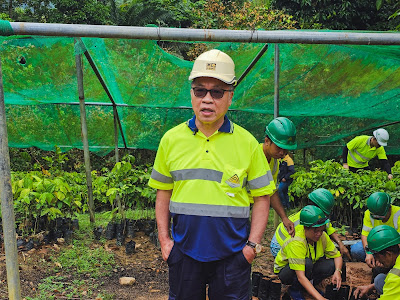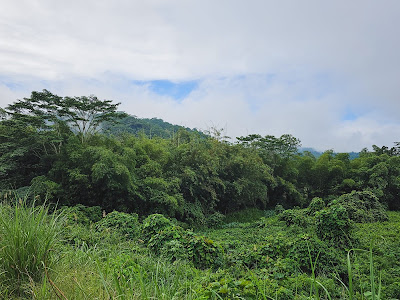Caraga mining firm propagates bamboo trees in support of disaster resilience programs
By Jennifer P. Gaitano
BUTUAN CITY – In support of the government’s National Greening Program (NGP), the Philsaga Mining Corporation and Mindanao Mineral Processing and Refining Corporation, covering the municipalities of Rosario and Bunawan in the province of Agusan del Sur, intensified its efforts in propagating their bamboo tree plantations, which are expected to benefit more Caraganons, and form part of the local government units’ disaster resilience programs.
To date, the said mining company in Agusan del Sur has already planted about 1,370,074 tree species since 1997, including giant bamboo trees and fruit trees within the 2,316.53 hectares of plantation in the aforementioned municipalities and neighboring areas.
The Indigenous Peoples (IP) community in the two towns of Agusan del Sur have directly benefited from Philsaga’s environmental protection initiatives and provision of livelihood to the localities.
Bae Elvera Catuburan, an IP from Rosario, Agusan del Sur, acknowledged the effort of Philsaga in restoring the bountiful mountains of the province by helping the IP community plant different species of fruit trees and bamboos.
“They have been providing the IP community with seedlings that we can propagate on our farmland. We are thankful for their continued support and assistance to our community,” said Catuburan.
Datu Banikop Rafael Dique, tribal chieftain of Barangay San Marcos, Rosario, Agusan del Sur, also expressed his gratitude to the government agencies involved in the implementation of the National Greening Program, together with Philsaga in the province, for their great concern for the environment and for constantly extending help to the IP community.
“The bamboo propagation has greatly helped us in preventing soil erosion at the Simulao River in Agusan del Sur, and we are benefiting from the fruit trees as well that are being planted in the area,” shared Dique.
Atty. Raul Villanueva, president of Philsaga, revealed that the mining firm has three operational nurseries. “We have the agroforest nursery (main nursery) with a one-hectare-area covered with 200,000 seedlings; Satellite nursery at the mine site in an 800-square meter area covered with 75,000 seedling capacity; and Mangrove nursery in Barobo in a 1,000-square-meter area covered with 5,000 seedling capacity,” he said.
Villanueva also emphasized the importance of bamboo planting, which has been observed to be one of the most effective ways to clean the air and protect the environment against soil erosion, much like mangrove plants.
This effort is aligned with the company’s enduring commitment to environmental sustainability, for which Philsaga has been known for years, as it fulfills its corporate social responsibility by bringing various environmental and livelihood programs down to the grassroots.
“Philsaga Mining Corporation’s dedication to environmental stewardship and active community engagement serves as a model for how industries can play a pivotal role in fostering a sustainable future. As PMC continues to demonstrate, bamboo planting is just one facet of its broader, continuous efforts to harmonize responsible resource management with environmental preservation,” added Villanueva.
According to Engr. Ferdinand Cortes, vice president of Philsaga, said their organization has also ventured into the marine habitat protection program through “Adopt-a-Mangrove” by planting 12,500 mangrove propagules along the fish-rich coastal town of Barobo in the province of Surigao del Sur.
Bamboo planting initiatives
The giant bamboo, which is known for its remarkable carbon dioxide absorption and soil erosion prevention properties, has become a focal point of PMC’s reforestation endeavors.
Mine site: PMC has made a significant impact on the communities by planting 11,750 giant bamboo trees, covering 11.5 hectares of land at its mine site.
Mill site: Expanding its sustainability efforts beyond its mining areas, PMC has planted 5,365 giant bamboo trees, spanning 7.35 hectares at its mill site.
Agroforest nursery: The PMC was able to put in place the additional 900 bamboo seedlings that are available at the agroforest nursery. This outreach invites localities and like-minded organizations to join PMC in its ongoing environmental initiatives.
 |
Government’s National Greening Program
The National Greening Program (NGP) is the country’s most ambitious reforestation program to date. It seeks to plant 1.5 billion trees on 1.5 million hectares for a period of six (6) years, from 2011 to 2016.
Executive Order No. 26, signed on February 24, 2011 by President Benigno S. Aquino III, serves as the legal basis for the implementation of the NGP. Executive Order 193, s. 2015 expands its coverage from 2016 to 2028.
The order provides, among others, that the NGP shall be implemented as a National Convergence Initiative among three (3) national government agencies, namely the Department of Agriculture (DA), Department of Agrarian Reform (DAR), and the Department of Environment and Natural Resources (DENR), with the latter as the lead agency. (JPG, PIA-Agusan del Sur)



